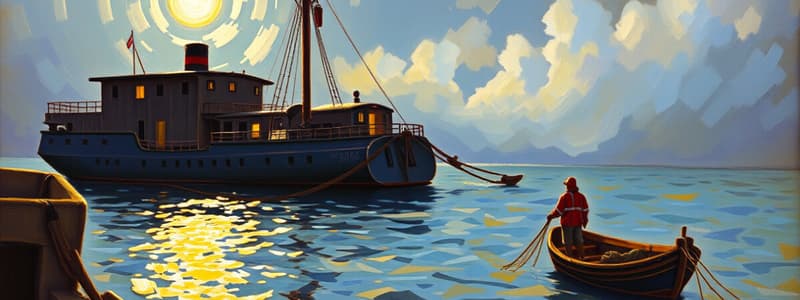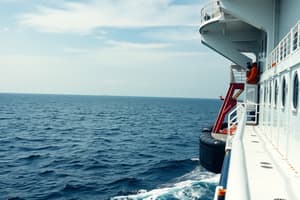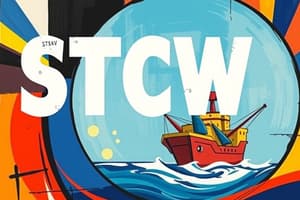Podcast
Questions and Answers
What is a significant technological advancement impacting the maritime industry?
What is a significant technological advancement impacting the maritime industry?
- Focus solely on traditional shipping methods
- Increased use of manual labor
- Adoption of digital technologies like automation (correct)
- Development of renewable resources only
What is one of the main goals of decarbonization in the maritime sector?
What is one of the main goals of decarbonization in the maritime sector?
- Expand the use of heavy fuel oil
- Increase the reliance on fossil fuels
- Delay the adoption of new technologies
- Reduce carbon emissions (correct)
How are global trade patterns influenced by emerging markets?
How are global trade patterns influenced by emerging markets?
- Only established markets affect supply chains
- There is less demand for shipping services
- Creation of new trade routes to connect with global markets (correct)
- Emerging markets have no impact on shipping routes
What initiative aims to enhance trade routes across Asia, Europe, and Africa?
What initiative aims to enhance trade routes across Asia, Europe, and Africa?
What is a consequence of economic growth in emerging markets on ports?
What is a consequence of economic growth in emerging markets on ports?
What is a primary goal of emissions regulations in the maritime industry?
What is a primary goal of emissions regulations in the maritime industry?
Which emerging technology is primarily used for predictive maintenance in the maritime sector?
Which emerging technology is primarily used for predictive maintenance in the maritime sector?
What demographic trend is affecting the maritime industry workforce?
What demographic trend is affecting the maritime industry workforce?
Which of the following is NOT a focus of waste management regulations?
Which of the following is NOT a focus of waste management regulations?
Which emerging technology helps in optimizing routes in maritime navigation?
Which emerging technology helps in optimizing routes in maritime navigation?
What advantage does ammonia have over hydrogen as a fuel?
What advantage does ammonia have over hydrogen as a fuel?
Which of the following is a primary focus of the regulations implemented by the International Maritime Organization (IMO)?
Which of the following is a primary focus of the regulations implemented by the International Maritime Organization (IMO)?
How do geopolitical tensions affect maritime trade?
How do geopolitical tensions affect maritime trade?
What is a practical benefit of using biofuels like biodiesel?
What is a practical benefit of using biofuels like biodiesel?
Which of the following statements regarding regionalization is true?
Which of the following statements regarding regionalization is true?
Flashcards
Technological Advancements
Technological Advancements
Using automation, AI, and blockchain to improve efficiency and safety.
Decarbonization Efforts
Decarbonization Efforts
Switching to fuels like hydrogen and designing vessels for energy efficiency.
Changing Global Trade Patterns
Changing Global Trade Patterns
New routes like China's Belt and Road that require better port facilities.
Geopolitical Tensions
Geopolitical Tensions
Signup and view all the flashcards
Regulatory Changes
Regulatory Changes
Signup and view all the flashcards
Regionalization
Regionalization
Signup and view all the flashcards
IMO Regulations
IMO Regulations
Signup and view all the flashcards
Environmental Policies
Environmental Policies
Signup and view all the flashcards
Aging Workforce
Aging Workforce
Signup and view all the flashcards
Workforce Diversity
Workforce Diversity
Signup and view all the flashcards
Skill Shortages
Skill Shortages
Signup and view all the flashcards
Artificial Intelligence
Artificial Intelligence
Signup and view all the flashcards
Maritime IoT
Maritime IoT
Signup and view all the flashcards
Blockchain
Blockchain
Signup and view all the flashcards
Big Data & Analytics
Big Data & Analytics
Signup and view all the flashcards
Study Notes
Course Overview
- Course on Trends, Issues, and Breakthroughs in the Maritime Industry is part of the College of Maritime Education curriculum.
- Focuses on the STCW 2010 Code requirements for knowledge, understanding, and proficiency.
Course Learning Outcomes
- Understanding global economic trends and their political ramifications within maritime.
- Insight into demographic changes and emerging technologies impacting the maritime sector.
Economic Trends
- Technological Advancements: Implementation of automation, AI, and blockchain to boost efficiency, cut costs, and enhance safety.
- Decarbonization Efforts: Shift towards alternative fuels like hydrogen and ammonia, and innovation in energy-efficient vessel designs.
- Changing Global Trade Patterns: Emergence of new trade routes, particularly through initiatives like China's Belt and Road, necessitating enhanced port infrastructure.
- Port Development: Upgrades in ports in emerging markets to manage increased cargo volumes and improve logistics.
Political Factors
- Geopolitical Tensions: Issues like trade wars and territorial disputes disrupt maritime operations, with examples including tensions in the South China Sea.
- Regulatory Changes: International regulations from bodies like the IMO focus on safety, environmental standards, and labor conditions.
- Regionalization: Countries are prioritizing regional trade agreements over global ones.
International Maritime Organization (IMO)
- Implements regulations for reducing greenhouse gas emissions, such as the Energy Efficiency Design Index (EEDI) and Ship Energy Efficiency Management Plan (SEEMP).
- Safety regulations are evolving to enhance maritime operation standards.
Environmental Policies
- Stricter regulations on emissions and waste management force the maritime industry towards sustainable practices.
- Emphasis on cleaner technologies, pollutant limits, and proper waste disposal procedures.
Top 10 Trends in the Maritime Industry (2025)
- Rising influence of technologies like Artificial Intelligence, Clean Energy, Maritime Robotics, Energy-Efficient Integrations, Maritime IoT, Blockchain, Big Data & Analytics, Immersive Reality, 5G, and Cybersecurity.
Demographic Trends
- Aging Workforce: Experienced professionals retiring raises the need for skilled younger workers.
- Workforce Diversity: Initiatives are underway to include more women and underrepresented groups in maritime careers.
- Skill Shortages: A notable demand for advanced technical skillsets, especially in IT.
Emerging Technologies
- Artificial Intelligence: Enhances predictive maintenance, autonomous navigation, through processing vast data for better decision-making; contributes to operational sustainability.
- Maritime IoT: Enables continuous ship tracking and monitoring, improving navigation and regulatory compliance by providing detailed operational data.
- Blockchain: Enhances data integrity and trust through transparent and tamper-proof storage, streamlining operations and increasing efficiency.
- Big Data & Analytics: Processes extensive data from various sources to generate insights on vessel operations, aiding in decision-making for improved efficiency.
- Immersive Reality: Utilizes VR and AR for training and remote operations, increasing proficiency among operators.
- 5G Connectivity: Supports high volumes of IoT data transmission with low latency, optimizing operations and remote management in maritime environments.
Studying That Suits You
Use AI to generate personalized quizzes and flashcards to suit your learning preferences.




